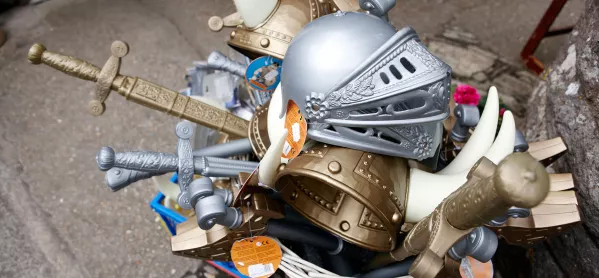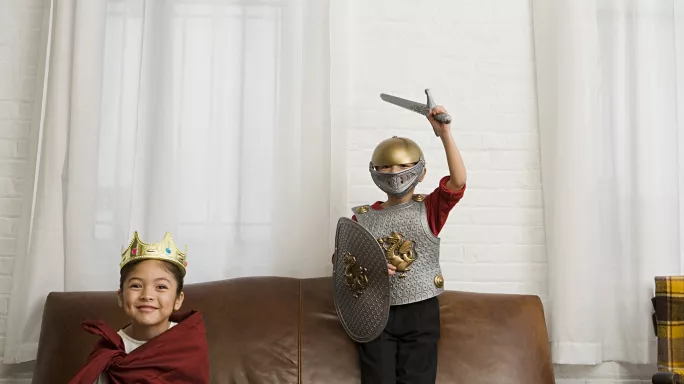- Home
- Three ways to improve key stage 3 history
Three ways to improve key stage 3 history

“Why does it matter if I know who William the Conqueror was anyway? I want to be a plumber…”
Why would history matter to a 16-year-old?
What’s the point of learning about how the Mormons travelled westward when all you want to do is join the army?

Who cares about Vesalius mapping the human body if you don’t want to be a doctor?
In the era of the EBacc, where many pupils have to take history (or geography), it’s our job to make the subject more relatable and enjoyable.
Perhaps it’s no wonder that they don’t see the relevance to their lives when we’re teaching them about spinning jennies and wattle and daub houses while they have the latest smartphones burning a hole in their pockets.
But how can we encourage our students to see that bigger narrative, full of stories and lessons and incredible people? And one that is, moreover, hugely beneficial to their education?
Get creative
Start with your key stage 3 curriculum; two or three years to find the joy in history. Instead of teaching the same topics, consider a revamp. When it comes to teaching the 20th Century, we pretty much all teach the Titanic, the suffragettes and the First and Second World War.
But a more exciting approach is to explore these eras through eyes of the incredible people who shaped them.
Instead of the Suffragettes, teach about the amazing life of Emmeline Pankhurst. Instead of trench life in the First World War, explore the war poets and their experiences. We recently implemented this and found a hugely positive outcome.
We taught shellshock in the First World War through the experience of Siegfried Sassoon and Wilfred Owen at Craiglockhart hospital, using the novel Regeneration by Pat Barker as evidence and letting pupils do their own research.
Not only did this make shellshock more relatable, but we tied it in with mental health awareness as we explored the stigma associated with shellshock at the time.
Get personal
What’s your favourite period of history? See if you can teach that! Exploring what you love will mean you are producing lessons and resources that are exciting, engaging and full of expertise.
Showing that you love a subject and have interesting facts and anecdotes about it will make your scheme of work 10 times more interesting.
We recently changed our A-level topics from the Russian Revolution to the US, 1945-80.
This is my era of personal historical expertise, and I adore teaching it. What’s more, the pupils are gaining so much from being able to draw on current affairs, linking the civil rights movement to the Black Lives Matter marches, for example.
Picking a topic that has modern-day relevance has shown them that history is all around and ever-present.
Get interesting evidence
Yes, we have GCSE content to get through, and alas some parts of it are not the most riveting, but we can make the interesting bits even more interesting.
When you’re teaching about the Battle of Wounded Knee, show the pupils scenes from Bury My Heart at Wounded Knee - unpick the historical issues and the inaccuracy of the portrayal. In doing so, you are practising the GCSE skills needed to analyse a source, in an engaging way.
And why not bring artefacts into your classroom? I am lucky enough to have my own First World War collection belonging to my great-great uncle, and every time I get out his medals, letters and souvenirs, it blows my students’ minds.
Most local libraries have artefact boxes you can rent, and analysing a real artefact, as opposed to a picture or written source, makes history tangible and powerful.
I am biased, of course. I adore history. Or rather, I adore most history (sorry industrial revolution, you’re just not my thing). I love its cycles, how it repeats itself, teaches us lessons and shows us the true nature of humanity.
But how to communicate that to a teenager? By showing how much you love it. By being passionate in your classroom, getting excited over topics, and thinking of new and engaging ways of teaching.
History may not be directly related to plumbing. But the skills it provides - analysis, evaluation, extended writing, being able to back up your point with evidence - are life skills.
And in that way, it prepares pupils for their futures, whatever they may be.
Kate Stocks is head of history at Baxter College in Kidderminster
Keep reading for just £1 per month
You've reached your limit of free articles this month. Subscribe for £1 per month for three months and get:
- Unlimited access to all Tes magazine content
- Exclusive subscriber-only stories
- Award-winning email newsletters